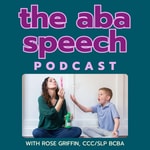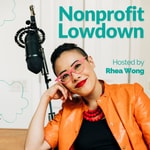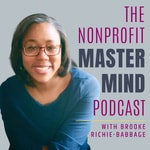The ABA Speech Podcast - Easy Strategies For Parents and Professionals – Details, episodes & analysis
Podcast details
Technical and general information from the podcast's RSS feed.

The ABA Speech Podcast - Easy Strategies For Parents and Professionals
Rose Griffin
Frequency: 1 episode/7d. Total Eps: 233

Join Rose Griffin, a dedicated Speech Therapist and BCBA from ABA SPEECH, as she shares her compassionate approach to supporting the communication needs of autistic individuals. With 20 years of experience, Rose is committed to respecting and understanding the diverse ways autistic people communicate and interact with the world.
This podcast is a resource for professionals and parents alike, offering practical strategies that honor each person's unique communication style. Rose covers a wide range of topics, including how to recognize and support autistic communication from an early age, the distinctions between autism and speech differences, and effective, respectful approaches to fostering communication, whether a child is non-speaking, minimally speaking, or verbal.
Through a mix of interviews and solo episodes, Rose explores how to enhance meaningful connections, address challenges with empathy, and celebrate the strengths of autistic individuals. Whether you're a parent, therapist, or educator, you'll find valuable insights and actionable advice to create supportive environments that empower communication and honor neurodiversity.
Hit subscribe and learn more at www.abaspeech.org.
Recent rankings
Latest chart positions across Apple Podcasts and Spotify rankings.
Apple Podcasts
🇨🇦 Canada - parenting
03/06/2025#86🇨🇦 Canada - parenting
17/05/2025#65🇨🇦 Canada - parenting
15/03/2025#95🇺🇸 USA - parenting
04/03/2025#95🇫🇷 France - parenting
17/01/2025#100🇫🇷 France - parenting
16/01/2025#66🇨🇦 Canada - parenting
28/12/2024#94🇨🇦 Canada - parenting
10/12/2024#94🇩🇪 Germany - parenting
13/10/2024#82
Spotify
No recent rankings available
Shared links between episodes and podcasts
Links found in episode descriptions and other podcasts that share them.
See all- http://www.inspiremereads.com
2138 shares
- https://www.buzzsprout.com/1004629
754 shares
RSS feed quality and score
Technical evaluation of the podcast's RSS feed quality and structure.
See allScore global : 52%
Publication history
Monthly episode publishing history over the past years.
#197: AAC- Factors To Guide Decision Making with Jean Jarrett
Episode 197
mardi 8 octobre 2024 • Duration 26:35
Approximately 25–30% of autistic children are minimally verbal, often requiring alternative communication methods like Augmentative and Alternative Communication (AAC). Jean Jarrett, SLP-BCBA, joins us to continue highlighting AAC during the month of October. Selecting the right AAC system can be overwhelming due to the many factors involved: communication partners, environments, and caregiver involvement. The process requires input from various disciplines, careful planning, and individualized support.
A common misconception is that children need to reach certain milestones before starting AAC, but there are no prerequisites. There is no need to wait or delay getting started with AAC to meet certain skills, but a learner’s skillset does play a critical part in the device chosen. When choosing an AAC system, factors to guide decision-making include device programming, environments in which it will be used, and potential insurance reimbursement.
Providers must be equipped to handle pseudoscientific approaches, such as Rapid Prompting or Spelling to Communicate, and focus on evidence-based practices like AAC, which can make a profound difference when used effectively. The journey with AAC doesn't end when the device is received; that's just the beginning.
#autism #speectherapy
What’s Inside:
- How to handle an overwhelming AAC assessment?
- Are there prerequisites for AAC?
- Questions and factors to consider when choosing an AAC device.
- Being equipped to handle pseudoscience.
Mentioned In This Episode:
Jean Jarrett on LinkedIn
jjarret@unc.edu
Join us in the ABA SPEECH Connection Membership
Rose Griffin (@abaspeechbyrose) on Instagram
#196: Using AAC To Support Autistic Learners with Chris Bugaj
Episode 196
mardi 1 octobre 2024 • Duration 46:48
October is AAC Awareness Month! Today’s guest, Chris Bugaj, is the co-host of the *Talking with Tech* podcast, which explores the world of AAC, inclusive design, and the creators, providers, and users behind these systems. As an SLP, Chris realized early in his career that he had a knack for technology, which led to his role on his district's Assistive Technology Team for Inclusive Learning.
During our chat, we discussed the history of early AAC devices, their flaws, and how these limitations impacted our ability to set effective goals. We’re so fortunate that technology and access to it have improved dramatically for our learners over the past two decades. We also touched on the concept of a growth mindset—a philosophy focused on breaking free from fixed ideas about abilities and embracing the "power of yet," ensuring we don't limit any learners in any way.
Chris has his formula for professional development in AAC down to a science. It begins with a facilitation meeting to assess training needs, followed by teaching sessions where communication partners join in-person or online courses focused on modeling through a unique training and coaching format. Finally, there are follow-up practice sessions and feedback to reinforce learning.
When AAC training and coaching are effective, they impact not just one learner but every learner that provider or teacher will work with in the future. We offer many AAC courses at ABA Speech Connection, so don’t forget to check them out and join us!
#autism #speectherapy
What’s Inside:
- October is AAC Awareness Month.
- The history of AAC.
- A clear plan for professional development and training for AAC.
- Find more info through AAC course on ABA Speech Connection.
Mentioned In This Episode:
Join us in the ABA SPEECH Connection Membership
Rose Griffin-Autism Speech Therapy Tips (@abaspeechbyrose) • Instagram
#187: An Autism Journey with Susanna Peace Lovell
Episode 187
mardi 30 juillet 2024 • Duration 31:16
I always love the opportunity to talk with a parent and hear their story. I feel it really provides an opportunity for learning and growth as a provider. Susanna Peace Lovell, a professional life coach and advocate, joins me to discuss her journey as a parent of a child with autism and her book on the topic, Your True Self is Enough: Lessons Learned on My Journey Parenting a Child with Autism.
In her book Your True Self is Enough, Susanna shares her story of being of support and service to parents and families with similar stories. This journey begins at the birth of her first child, Arizona. The difficulties began right away with food allergies and skin issues, and the diagnosis and challenges just kept coming. Susana says that her daughter cried for what felt like nonstop for the entirety of her first 18 months of life. At age 2.5, Arizona was diagnosed with ASD. This was nearly 16 years ago, and for Susanna, this was a challenging and unfamiliar experience.
You can find out more about Susanna's journey in her book, which she describes as part memoir, part guidebook, where she finds a balance between honoring her child’s experience while also honoring her own journey and voice. Her daughter, Arizona, wrote the foreword and inspired the title.
If you have this feeling that something is different, Susanna says to stay in tune with that feeling, which she calls the “Caregiver Gut." Write everything down; no detail is too little. She reminds us that being an advocate for your child requires tenacity and a help seeking mentality. The doors can be opened just a little bit more when you’re vulnerable to those who can help.
#autism #speectherapy
What’s Inside:
- A Parent’s Autism Story
- Navigating honoring your child’s experience and your experience as the caregiver
- What to do when you're facing challenges with your child and suspect developmental delays?
Mentioned In This Episode:
Susanna Peace Lovell
Your True Self Is Enough: Lessons Learned on My Journey Parenting a Child with Autism by Susanna Peace Lovell
Get our Ethics Course about SLP/BCBA Collaboration in the ABA SPEECH Connection
Rose Griffin (@abaspeechbyrose) on Instagram
#098: How to Become a BCBA - Rachel Torrance
Episode 98
mardi 15 novembre 2022 • Duration 27:07
Rachel Torrance is a BCBA, License intervention specialist, on the board at Milestones Autism Resources, and a Consultant working with parents, school districts, and private agencies to advocate appropriate services and achieve desirable outcomes. Rachel also happens to be my business partner at Supervision Academy, a virtual resource for attaining supervision hours to become a certified BCBA.
Becoming a BCBA requires coursework (as a master’s program or post-master’s), Hours, Supervision, Observations, Feedback, Formal Exam, and more. Supervision for a traditional path requires 2000 hours directly supervised by an experienced BCBA or group of BCBAs.
At Supervision Academy we know becoming a BCBA is hard work and stressful, and finding a supervisor can be nearly impossible at times. We offer a virtual group of supervisors providing clinical expertise, behavior skills training, guidance, feedback, and more. Additionally, we strive to provide robust supervision, tailoring your experience to your career goals.
When finding a supervisor for this very important piece of your certification we encourage you to cover all of your bases. Rachel suggests asking and considering these questions when interviewing supervisors.
- Do you have a curriculum and are you set in this curriculum?
- Are you open to thinking outside the box?
- How do you determine what you're going to teach and individualize?
- What does a typical meeting look like?
- What does supervising feedback look like?
- What experience does the supervisor have?
- Do they have a contract?
- What systems do they have in place for the supervising process?
- How do they meet HIPAA and FERPA laws for virtual interactions?
- Does the supervisor meet the rules and laws of the state for practicing ABA?
Please note that all information provided in this episode is current as of November 2022. If you’re interested in learning more about Rachel Torrance and her work you can check out her consulting website, as well as visit the Supervision Academy page to find out how we can help you with supervision to become a BCBA!
#autism #speectherapy
What’s Inside:
- How do you become a BCBA?
- How has becoming a BCBA changed as the field has grown?
- What are the supervision requirements for becoming a BCBA?
- What is Supervision Academy?
- Questions you should be asking prospective supervisors.
Mentioned In This Episode:
Behavioral and Educational Expert Services
Supervision Academy
#097: Special Education Law with Catherine Michael
Episode 97
mardi 8 novembre 2022 • Duration 35:58
Parents, have you ever been in a situation where you're fighting with your child's school to get your child the services they deserve and are entitled to? Catherine Michael has spent more than 20 years working with families on designing success for special needs children. She is a managing partner at the law firm Connell Michael Kerr as well as the founder of Coffee with Catherine, which offers classes and resources for families of children with special needs.
A Free Appropriate Education
Every child in America is entitled to a free appropriate education. This means the support, services, accommodations, and environment that they have been evaluated for and determined to need for their educational success. The Individual Disabilities Education Act, outlines federally what special needs students are required to receive within schools. Many states have even codified and extended these laws into their own state statutes to give more rights to these families.
Educational Due Process
Due Process does not create damage, the goal of this action is to resolve and settle on the necessary support and services for a child as quickly as possible. As soon as the Educational Due Process is filed, a school has 15 days to come to a resolution with the family. If a resolution is not met then an Administrative Hearing will take place. This hearing is an informal relaxed hearing often taking place in a school, where the burden of proof lies on the parents. Catherine discusses the obstacles to the qualifications of the Hearing Officers for these settings and how they can negatively affect the outcome.
If you're a professional or parent seeking to learn more about Special Education Law check out the resources at Coffee with Catherine. Additionally, if you're located in Indiana, Michigan, Ohio, Pennsylvania, or Alaska and need legal assistance pertaining to special education, reach out via the Connell Michael Kerr, LLP website.
What’s Inside:
- Who does Special Education Law serve?
- What is Educational Due Process?
- What does it mean to receive a free appropriate education?
- How do parents and schools come to a resolution?
- What is an Administrative Hearing?
- What are the qualifications of a Hearing Officer?
Mentioned In This Episode:
Coffee with Catherine
Connell Michael Kerr, LLP
#096: Supporting SLPs Working in an ABA Setting with Julianne Trudeau
Episode 96
mardi 1 novembre 2022 • Duration 29:27
As an SLP-BCBA, collaboration is a really important part of my work. Julianne Trudeau is an SLP and Director of Speech Services at Bierman Autism Center. This center grew from a small in-home provider to a clinic-based therapy center with 17 locations across the country. Bierman operates a Collaborative Service Model in which BCBAs, SLPs, and OTs work together to best serve the child.
I've shared many stories in the past about the difficulty I've both seen and experienced with the collaboration between SLPs and BCBAs. Julianne uses an analogy, I love. BCBAs and SLPs are like a married couple, they may not always see eye to eye but they have the same goal at heart. This goal is in the best interest of the child. In collaborating together, BCBAs and SLPs can take a bit from each other to become better, more informed professionals and make the child the most successful as possible at the same time.
Bierman Autism Center increases the success of their collaborative service model by embedding opportunities into the schedule. Providers have embedded meetings for communication and collaboration for their cases. They also schedule weekly clinical staff meetings, monthly center staff meetings, and quarterly meetings for centers across the region. Bierman also embeds collaborative training opportunities for staff and parents.
Intake a Bierman begins with a family tour led by the center director. During this time services, goals, and collaborative ideas are discussed with the family. This visit will be followed up with an initial assessment and the parents will be provided the opportunity to have their child's ABA supplemented with service from other center providers such as SLPs and OTs. When a family chooses to participate in a collaborative service, each department will assess the child and collaborate and touch base on overlapping areas and goals.
You can find out more about Bierman Autism Centers at their website or on social media.
What’s Inside:
- What is a Collaborative Service Model?
- What is Collaborative Assessment?
- How SLPs, BCBAs, and OTs can effectively collaborate.
- Using Collaborative Assessment to get a true snapshot of the child.
- Planning appropriately for intervention.
Mentioned In This Episode:
Bierman Autism Centers
#095: A Family's Autism Journey- A Chat with Autumn Ziemba
Episode 95
mardi 25 octobre 2022 • Duration 31:44
Autumn Ziemba was working as a news anchor for Fox 8 News when her son received his autism diagnosis. Through her family journey and support in the autism community, Autumn has shifted careers to become the Communications and Content Manager for Milestones Autism Resources.
As a mother of two, Autumn knew what to expect for typical development in her young children. When her youngest started showing signs of regression, loss of speech, disinterest in typical play, and others around her began to notice too, it was time for an evaluation. With the support of her family’s pediatrician, her son was able to receive a diagnosis at age 2 and a half. This was in 2017 and the times were different when it came to support, resources, and services. Her son started with play-based ABA and speech therapy for one hour a week, not nearly enough. To add to their hardship, just three months post-diagnosis her son was diagnosed with Leukemia. Their focus had to shift from early intervention to cancer treatment. After the early days and weeks of treatment, their family was able to bring back ABA therapy and other services. Now at 7 years old, Autumn's son is a Leukemia-Survivor and attending school in a special needs classroom with great support from their school district.
As a parent who has been through so much with her son and her family, Autumn’s biggest advice to professionals, providers, teachers, and anyone working with autism families is to have empathy. For her empathy, compassion, and understanding goes a long way. I’ve seen firsthand professionals and other parties be less than supportive of families with questions, and agendas. But Autumn reminds us that parents are coming in with only their children’s best interest at heart, and it's important to understand that.
For families just beginning their autism journey whether pre or post-diagnosis: Do not fear the diagnosis. Autumn shares that while a concrete diagnosis can feel scary, it can actually open up doors to resources, services, and support that you wouldn't otherwise have. Take each day as it comes, and remember not every approach will work for every child. Meet your child in the middle and allow them to be a part of their own team!
If you’d like to find out more about Autumn Ziemba you can find her family's autism story online, as well as her contact information on the Milestones website.
What’s Inside:
- Autumn Ziemba and her family’s autism journey.
- Seeing the early signs of autism.
- Navigating resources and services post-diagnosis.
- Tips for professionals communicating with parents.
- Advice for autism families.
Mentioned In This Episode:
#094: 10 Ideas To Increase Student Engagement
Episode 94
mardi 18 octobre 2022 • Duration 30:12
I haven’t done a solo show in a while and I am excited today to share my 10 strategies to increase student engagement. I had a client, let’s call him Adam for today, and when I started working with him, he did not communicate or even engage at all. I would bring different toys and objects to try to get his attention through play-based learning but we would just take a toy and leave. About after 4 sessions with him, his parents started asking me when am I going to use a more structure approach and really work on his communication skills. Truthfully, I felt defeated and anxious.
But at 20 plus years into my career already, I have done so much research about joint attention and how valuable this is to ABA and Speech Therapy. On our 5th session, I brought Mini Objects in a bag and although Adam’s engagement was still fleeting then, he picked up a toy form the bag and it was a shoe. Adam exclaims, “Shoe!” and we were all so excited because that was his first word during his sessions! It was in this moment that I realized that Adam has started his journey with communication and when we realize that these small steps every session matter, it opens up a path for spontaneous communication. So today, I share and break down my top 10 tips I applied to help increase Adam’s engagement in therapy.
- Start with something fun that your student enjoys.
- Work on shared activities.
- Use books for your students.
- Use a song.
- Analyze when your student needs a break.
- Target the IEP goals.
- Take the data and be specific.
- Get up and moving.
- What does your student love and enjoy and how can you embed that into your sessions?
- Where do you see the student? What environment do you work in?
Every student is different so with these strategies, you really need to be creative and discern what works for your student at the moment. What works for one student may or may not work for another. If you have a student in mind that you want to help start communicating, these strategies will really be beneficial to improving your relationships with your students and increasing their learner engagement. For more tips and information on helping students with communicating, check out our ASHA approved 5-hour course, Start Communicating Today.
#autism #speectherapy
What’s Inside:
- A case study about a student who had zero engagement.
- Why play-based learning and joint attention is important.
- My 10 strategies to increase learner engagement.
- How to apply these 10 strategies to your therapy sessions.
Mentioned in this Episode:
ABA Speech
Start Communicating Today Course
#093: ABA for SLPs with Dr. Joanne Gerenser
Episode 93
mardi 11 octobre 2022 • Duration 31:10
I love this power statement: “If you don’t believe in ABA, it’s like you don’t believe in breathing.” It’s a really impactful tidbit from my chat with Dr. Joanne Gerenser, SLP and Executive Director of the Eden II Programs. Dr. Gereneser and I discuss the importance of ABA in the field, as well as what that means for collaborating with other professionals; having SLPs and BCBAs work together with ABA to serve students with autism, especially those with challenging behavior.
There are some professionals and parents in the field that just really don’t understand what ABA is. There can be a lot of mean-spirited, negative, information online about ABA depending on where you’re looking. When you really look at it and understand the professionals working in the ABA field and the help it can provide to the autism community with serious learning and behavior challenges, you will see just how important it is.
When it comes to collaboration, you can’t paint every BCBA with the same brush just the same as SLPs. The worst therapists are not representative of the entire field and you cannot walk into an interaction with telling the other professional what to do; It erodes the professional relationship.
Dr. Gerenser’s techniques for communicating with hesitant professionals:
- Build a professional relationship.
- See the person beyond the technique.
- Be humble, you don’t know all the answers.
You can find out more about Eden II and Dr. Joanne Gerenser, visit Eden II Programs online.
#autism #speectherapy
What’s Inside:
- Using ABA in Speech Therapy
- How to collaborate with hesitant professionals
- Serving students with problem behaviors as an SLP
Mentioned In This Episode:
Home - Eden II Programs (eden2.org)
ABA Speech: Home
Register for the free SLP in an ABA Setting Mentorship webinar
#092: Culturally Responsive Intervention For Autistic Learners with Maria Davis-Pierre
Episode 92
mardi 4 octobre 2022 • Duration 31:23
As therapists we know that every client is different when it comes to goals, abilities, and needs but how often are we checking up on our cultural awareness for each individual? Maria Davis-Pierre is a mental health counselor and the founder of Autism in Black. As a mother with two autistic children and autism herself, Maria understands the stigma associated with the diagnosis and is on a mission to educate on inclusive, culturally responsive therapy for black families and other underrepresented cultures.
“Is there anything culturally we should know about you?” A question Maria highlights as one of the best questionnaire form inclusions she has seen when it comes to starting therapy. As a professional and therapist working with unique individuals from all cultures and backgrounds, there are no details too small to incorporate into therapy that fit your client's culture. For example, bring culturally relevant props for a therapy lesson or check your understanding of cultural concepts that could be a typical household routine for one culture but seen as a learning deficit in another.
Whether props, books, flashcards, etc. be cognisant of your materials and the reflection of your client within them. It is important for black children to see themselves reflected in their learning materials to not only understand but also stay engaged. It is okay if you’re not an expert on every culture and every family. Ask questions, be open, and create a dialog so that you can continue to learn and support your clients in a culturally responsive way.
What to keep in mind when getting started with culture-responsive therapy:
- It's okay to be uncomfortable, check your bias. Growth comes from uncomfortability.
- Use representative tools and materials.
- Be curious and ask questions. Life-long learning process.
- Be open, honest, and admit when you make mistakes.
As therapists and professionals are number one, the goal is to always help the children and culturally responsive therapy is a really important but often forgotten piece of that. Maria shares some great tips and insights for professionals to consider. You can find out more about her work on the Autism in Black website.
What’s Inside:
- How can we as professionals be more culturally responsive?
- Tips and strategies for being culturally responsive and inclusive in your therapy sessions?
- How to incorporate your clients' unique cultural needs?
- Check your understanding: Learning Deficit vs. Cultural Preference
Mentioned In This Episode:
Autism in Black
ABA Speech: Home
Register for the free SLP in an ABA Setting Mentorship webinar









